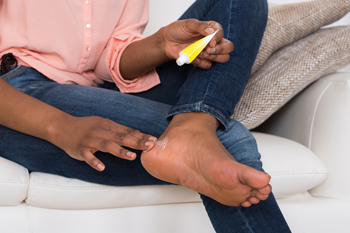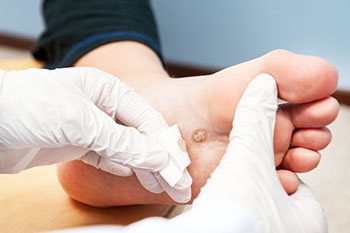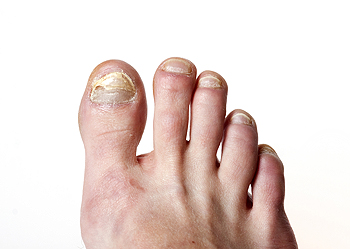Items filtered by date: April 2021
Are Bunions Affecting Your Everyday Life?
Is Heel Pain a Common Occurrence?
 The calcaneus, or heel bone, and its supporting fat pad, tendons and ligaments bear the brunt of the body’s weight and impact, while absorbing the stress of walking and running. For this reason, it is not uncommon for people of all ages and lifestyles to develop heel pain. Children and adolescents can develop Sever’s Disease when the growth plate of the calcaneus is repeatedly stressed due to growth spurts or physical activity. Plantar fasciitis (inflammation of the tissue on the bottom of the foot from heel-to-toe) and Achilles tendonitis (inflammation of the tendon connecting the calf muscles to the heel bone) can occur at any age, but is most common among adults. Whatever your lifestyle or age, contact a podiatrist if you or someone you love is experiencing any type of heel pain.
The calcaneus, or heel bone, and its supporting fat pad, tendons and ligaments bear the brunt of the body’s weight and impact, while absorbing the stress of walking and running. For this reason, it is not uncommon for people of all ages and lifestyles to develop heel pain. Children and adolescents can develop Sever’s Disease when the growth plate of the calcaneus is repeatedly stressed due to growth spurts or physical activity. Plantar fasciitis (inflammation of the tissue on the bottom of the foot from heel-to-toe) and Achilles tendonitis (inflammation of the tendon connecting the calf muscles to the heel bone) can occur at any age, but is most common among adults. Whatever your lifestyle or age, contact a podiatrist if you or someone you love is experiencing any type of heel pain.
Many people suffer from bouts of heel pain. For more information, contact our podiatrists of CNY Foot Surgery & Podiatry Care. Our doctors can provide the care you need to keep you pain-free and on your feet.
Causes of Heel Pain
Heel pain is often associated with plantar fasciitis. The plantar fascia is a band of tissues that extends along the bottom of the foot. A rip or tear in this ligament can cause inflammation of the tissue.
Achilles tendonitis is another cause of heel pain. Inflammation of the Achilles tendon will cause pain from fractures and muscle tearing. Lack of flexibility is also another symptom.
Heel spurs are another cause of pain. When the tissues of the plantar fascia undergo a great deal of stress, it can lead to ligament separation from the heel bone, causing heel spurs.
Why Might Heel Pain Occur?
- Wearing ill-fitting shoes
- Wearing non-supportive shoes
- Weight change
- Excessive running
Treatments
Heel pain should be treated as soon as possible for immediate results. Keeping your feet in a stress-free environment will help. If you suffer from Achilles tendonitis or plantar fasciitis, applying ice will reduce the swelling. Stretching before an exercise like running will help the muscles. Using all these tips will help make heel pain a condition of the past.
If you have any questions please contact our office located in East Syracuse, NY . We offer the newest diagnostic and treatment technologies for all your foot and ankle needs.
Why Do Cracked Heels Occur?
 Cracked heels are a common foot problem. The skin on the heels can become thick and can begin to peel and crack, possible causing severe pain and discomfort. There are specific reasons why cracked heels may develop. These can consist of having a thyroid disorder, fungal infection, or diabetes. Additionally, patients who are overweight, or have skin conditions including psoriasis or eczema may be prone to getting cracked heels. Cracked heels may be prevented by wearing shoes that have a closed back, and it may help to refrain from standing on hard surfaces for the majority of the day. There are many types of treatments for cracked heels, and it is suggested that you seek the counsel of a podiatrist who can choose the correct treatment for you.
Cracked heels are a common foot problem. The skin on the heels can become thick and can begin to peel and crack, possible causing severe pain and discomfort. There are specific reasons why cracked heels may develop. These can consist of having a thyroid disorder, fungal infection, or diabetes. Additionally, patients who are overweight, or have skin conditions including psoriasis or eczema may be prone to getting cracked heels. Cracked heels may be prevented by wearing shoes that have a closed back, and it may help to refrain from standing on hard surfaces for the majority of the day. There are many types of treatments for cracked heels, and it is suggested that you seek the counsel of a podiatrist who can choose the correct treatment for you.
Cracked heels are unsightly and can cause further damage to your shoes and feet. If you have any concerns, contact our podiatrists from CNY Foot Surgery & Podiatry Care. Our doctors can provide the care you need to keep you pain-free and on your feet.
Cracked Heels
Cracked heels appear unappealing and can make it harder for you walk around in sandals. Aside from looking unpleasant, cracked heels can also tear stockings, socks, and wear out your shoes. There are several methods to help restore a cracked heel and prevent further damage.
How Do You Get Them?
Dry skin is the number one culprit in creating cracked heels. Many athletes, walkers, joggers, and even swimmers suffer from cracked heels. Age and skin oil production play a role to getting cracked heels as well.
Promote Healing
Over the counter medicines can help, especially for those that need instant relief or who suffer from chronic dry feet.
Wear Socks – Wearing socks with medicated creams helps lock in moisture.
Moisturizers – Applying both day and night will help alleviate dryness which causes cracking.
Pumice Stones – These exfoliate and remove dead skin, which allows for smoother moisturizer application and better absorption into the skin.
Change in Diet
Eating healthy with a well-balanced diet will give the skin a fresh and radiant look. Your body responds to the kinds of food you ingest. Omega-3 fatty acids and zinc supplements can also revitalize skin tissue.
Most importantly, seek professional help if unsure how to proceed in treating cracked heels. A podiatrist will help you with any questions or information needed.
If you have any questions, please feel free to contact our office located in East Syracuse, NY . We offer the newest diagnostic and treatment technologies for all your foot care needs.
What Causes Toenails to Turn Yellow?
Yellow toenails that are not due to aging or nail polish residue can sometimes be a sign of a fungal infection. Fungal nail infections, or onychomycosis, are commonly caused by dermatophytes which eat the keratin in nails. This can make the nail turn yellow or black, or develop white patches or yellow spots. Athletes, or people with diabetes, peripheral vascular disease and poor blood circulation are more likely to develop toenail fungus. You can help prevent toenail fungus by keeping your toenails clean, dry, and trimmed straight across, wearing clean socks and shoes that fit properly, and airing out shoes after use. Toenail fungus is usually treatable with anti-fungal medicine. If you notice any change in the color, texture or thickness of your toenails, contact a podiatrist.
If left untreated, toenail fungus may spread to other toenails, skin, or even fingernails. If you suspect you have toenail fungus it is important to seek treatment right away. For more information about treatment, contact our podiatrists of CNY Foot Surgery & Podiatry Care. Our doctors can provide the care you need to keep you pain-free and on your feet.
Symptoms
- Warped or oddly shaped nails
- Yellowish nails
- Loose/separated nail
- Buildup of bits and pieces of nail fragments under the nail
- Brittle, broken, thickened nail
Treatment
If self-care strategies and over-the-counter medications does not help your fungus, your podiatrist may give you a prescription drug instead. Even if you find relief from your toenail fungus symptoms, you may experience a repeat infection in the future.
Prevention
In order to prevent getting toenail fungus in the future, you should always make sure to wash your feet with soap and water. After washing, it is important to dry your feet thoroughly especially in between the toes. When trimming your toenails, be sure to trim straight across instead of in a rounded shape. It is crucial not to cover up discolored nails with nail polish because that will prevent your nail from being able to “breathe”.
In some cases, surgical procedure may be needed to remove the toenail fungus. Consult with your podiatrist about the best treatment options for your case of toenail fungus.
If you have any questions, please feel free to contact our office located in East Syracuse, NY . We offer the newest diagnostic and treatment technologies for all your foot care needs.
What Are Foot Warts?
 Have you noticed hard, coarse bumps of skin on your feet? If so, you may have foot warts. Plantar warts are tough lumps that may appear on the bottom of the foot. The lumps are usually circular and have tiny black dots in the middle. Plantar warts are caused by a human papillomavirus (HPV) infection of the skin. The HPV that causes plantar warts is a contagious virus that can be picked up through direct contact with contaminated surfaces or an infected person’s skin. While plantar warts may cause discomfort or pain while standing or walking, they usually do not cause any serious complications. Typical treatments for this condition includes applying topical medications or freezing the wart off. For more information about plantar warts, please consult with a podiatrist.
Have you noticed hard, coarse bumps of skin on your feet? If so, you may have foot warts. Plantar warts are tough lumps that may appear on the bottom of the foot. The lumps are usually circular and have tiny black dots in the middle. Plantar warts are caused by a human papillomavirus (HPV) infection of the skin. The HPV that causes plantar warts is a contagious virus that can be picked up through direct contact with contaminated surfaces or an infected person’s skin. While plantar warts may cause discomfort or pain while standing or walking, they usually do not cause any serious complications. Typical treatments for this condition includes applying topical medications or freezing the wart off. For more information about plantar warts, please consult with a podiatrist.
Plantar warts can be very uncomfortable. If you need your feet checked, contact our podiatrists from CNY Foot Surgery & Podiatry Care. Our doctors will assist you with all of your foot and ankle needs.
About Plantar Warts
Plantar warts are the result of HPV, or human papillomavirus, getting into open wounds on the feet. They are mostly found on the heels or balls of the feet.
While plantar warts are generally harmless, those experiencing excessive pain or those suffering from diabetes or a compromised immune system require immediate medical care. Plantar warts are easily diagnosed, usually through scraping off a bit of rough skin or by getting a biopsy.
Symptoms
- Lesions on the bottom of your feet, usually rough and grainy
- Hard or thick callused spots
- Wart seeds, which are small clotted blood vessels that look like little black spots
- Pain, discomfort, or tenderness of your feet when walking or standing
Treatment
- Freezing
- Electric tool removal
- Laser Treatment
- Topical Creams (prescription only)
- Over-the-counter medications
To help prevent developing plantar warts, avoid walking barefoot over abrasive surfaces that can cause cuts or wounds for HPV to get into. Avoiding direct contact with other warts, as well as not picking or rubbing existing warts, can help prevent the further spread of plantar warts. However, if you think you have developed plantar warts, speak to your podiatrist. He or she can diagnose the warts on your feet and recommend the appropriate treatment options.
If you have any questions please feel free to contact our office located in East Syracuse, NY . We offer the newest diagnostic and treatment technologies for all your foot and ankle needs.





